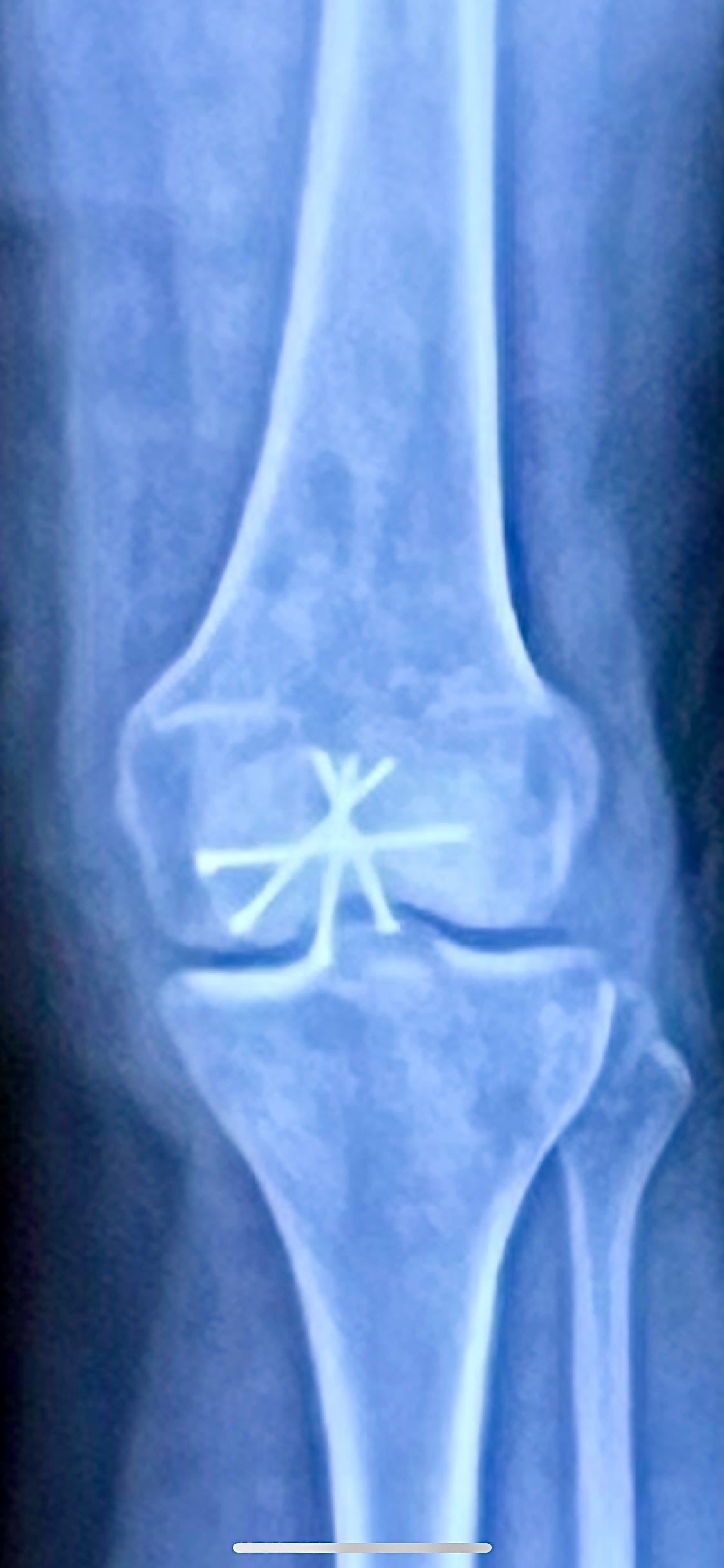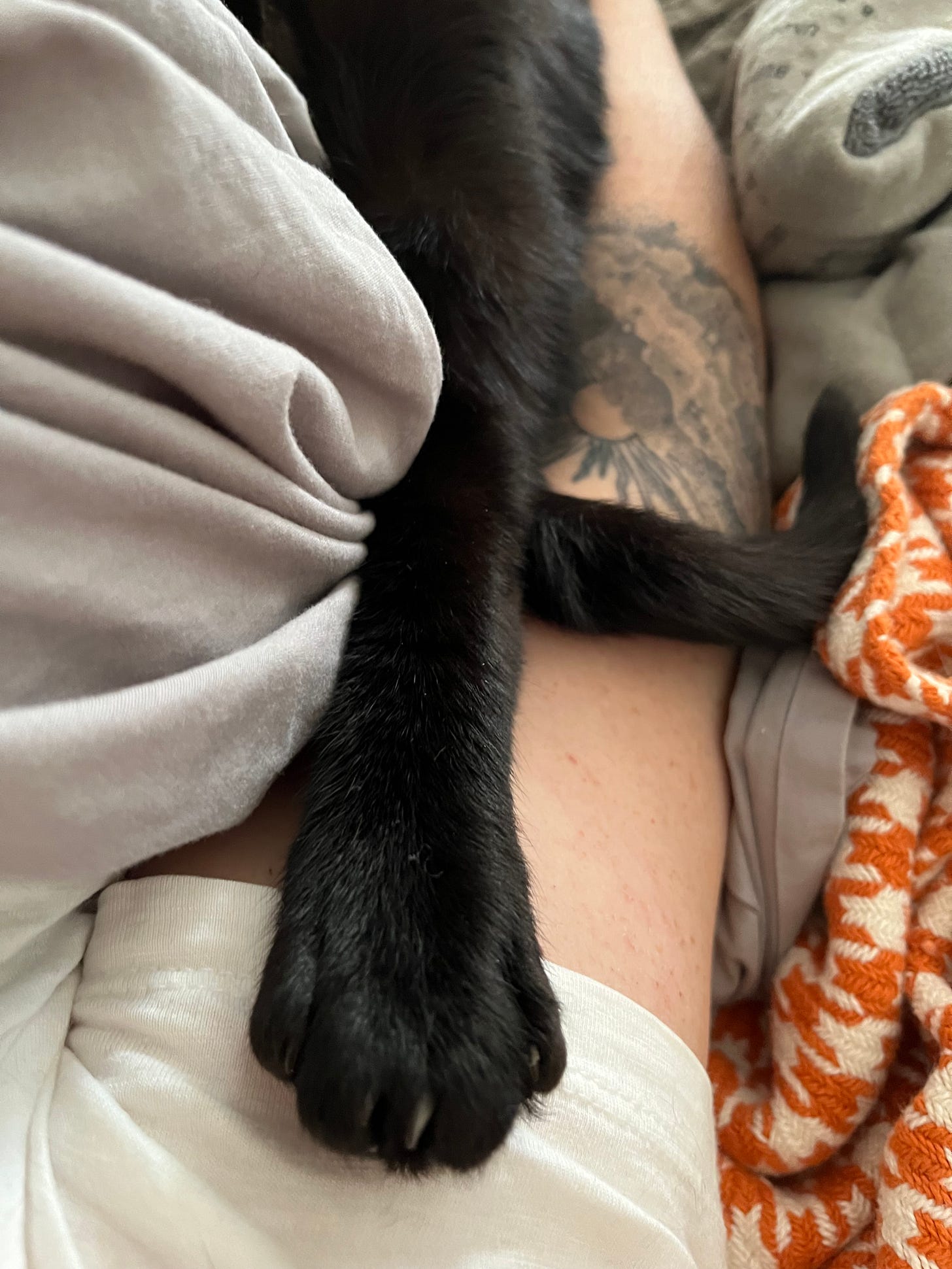Hello Loves,
Almost three weeks ago, I slipped on a piece of celery in a grocery store and fell and shattered my kneecap into at least seven pieces. Some of the pieces were a full inch apart. “Of course, this sort of thing is usually a surgical issue,” the ER doctor told me after I’d ridden in an ambulance for the third time in my life, this time in hyperventilation-inducing pain. There was a surgery, and a fog of time, and there now lives in my patella a collection of rods and screws that form the shape of an asterisk, a star, a small burst of firework.
Recovery from a knee surgery is one of the most intense orthopedic surgery recovery processes. There is a time when you cannot bend the knee, when you Velcro it with great force into an immobilizer that holds it perfectly still. There is a time when you should bend the knee with help, but without engaging the quad, another human gently manipulating your limb as you relax it completely. There is a time when you must wear a new brace that holds the knee at a new angle, softening and strengthening your range of motion. There is a time when you test and retest the strength of the bone, when you reverse the atrophy of the quad, when you walk. This usually takes two months. In my case, the orthopedic team looks at the X-rays and the way the bones and sinews have been hashed, and tells me that time isn’t relevant here, don’t count, it will be many, many months. I am still not allowed to move the knee.
This is the sort of thing that necessitates equipment. At the hospital when I was in the emergency room, I was first given crutches, then a walker. After surgery, the occupational therapist showed me how to use a device that resembled a Colonial child’s toy to put on your own socks and another to slip on your own shoes, though not one that could help you tie them. At home, I ordered these devices, which came in a pack with two sizes of long-handled grabbers and a leg lifter. We have named the leg lifter Lifter-Puller after the 90s band Lifter Puller, which makes us feel very GenX and vibrant, even as I totter around with my grey hair on the walker that Andy named Walker, Texas Ranger. The pack also had a sponge on a stick for sponge baths which I broke in two days. A week into maneuvering through my second floor with the walker made me buy grip padding to protect my hands. Two weeks in, I bought a lap desk. I need a shower chair. I need a machine that is a recirculating icepack. I need shoes to get me through a Chicago winter that are short enough to not hit my new brace, which makes me miss tall boot season, my favorite. I need compression socks that are shorter than the ones I already have, because, same. I need wide-legged pants that will go over my brace. I need to be able to sleep on my side with an orthopedic pillow that straps to my leg. As I came off the narcotics early to save my fragile kidneys and liver, panic attacks washed over me in waves at night, all centered around my inability to sleep as I always have, curled on my side like a shrimp, arms around my sleeping cat.
I am on many text chains with friends dealing with various kinds of body bullshit this year, sending each other daily reports about chemo, ortho, surgery, ERs, neurology consults. We’re mostly in our fifties.
Last year, our family started a weekly film festival we called Nothing Good Happens in Italy. It was meant to focus on great filmmaking from the post-war period in Italy and was predictably bleak but great as we curated watching hard things together after spending much of the pandemic zoning out on garbage. It branched out, the festival, to Nothing Good Happens in Japan, Nothing Good Happens in Germany, and we’re planning on Nothing Good Happens in The States. In there somewhere, we tried to find all the Spalding Gray that we could on streaming services, which was, sadly, not a lot. We watched 1996’s Gray’s Anatomy, about a complex problem with Gray’s eye, but really about aging and bodies and losing control. In it he describes your fifties as “the Bermuda Triangle of Health.” Your body collapses. So do those of the people around you. Some disappear into it. Some sail out the other side. He sailed out, for a while at least. I’m hoping all my people do. But this year has held a lot of funerals of the ones whose ships went down.
So, in those text chains, as we try to keep afloat, we send each other links to cute shoes that can be stepped into without having to be tied. We send imageas of pants that fit over braces but don’t feel like fashion of versions of ourseleves we don’t recognize. We plan drop offs for the mastectomy recovery robe that has belonged to three of my friends in six months. We take each other thrifting for clothes we’ll need very much, but only for six weeks. And in one of those chains, I began to type that I was spending a lot of money taking care of my new body. I stopped, looked at the language with my finally un-narcotic fogged brain, and thought, that phrase fucking sucks. This isn’t my “new” body. This is my “current” body. It will be like this for a while, and then it won’t.
I am not used to thinking this way. I was raised in a family where we shared an illness that was invisible until the slow decay inside flipped a switch and turned the bodies we knew into the kidney disease bodies we all feared—bloated, yellowed, painful, exhausted. I expected to have one body and then a new body that was a betrayer and a failure. I expected that I would be dead by the time I hit fifty, meaning that ordinary life, where illness and injury comes at intervals along a winding path, or unpredictably, or early, was the province of other kinds of humans. I might love them, but I was not with them.
Since I am alive, and 51, and have to figure out how to live, I need new language, and a new understanding of connection. My accident happened around the one-year anniversary of going on my wonder drug for PKD, Jynarque, something so rare that no one in the ER had ever heard of it. I had one body before the medication took effect—tired, constantly in pain, bursting cysts, wracked with vertigo, and frequently losing days or weeks to the need for bedrest. After going on the wonder drug, everything in my body changed. I had to drink water all the time. I had to pee all the time. But I suddenly had the energy I’d relied on in my 30s. My cysts didn’t burst as much. My pain was cut immediately in half. I could work all day. I could drive to Wyoming alone. I could climb at 13,000 feet. I could hike seven miles through the Ice Age Trail, and still drive home to Chicago. It wasn’t a new body. It was the body I had just then—a changing, dynamic, evolving container for all that I am, a thing I have loved and hated, that I have feared and gloried in. It will be new again tomorrow. Then it will be what it is on that day until it is something different. But every day it will be an invitation to remember that perfecting this body is impossible, and that thinking it can be perfected is something that can sink the ship as I go through these dangerous seas.
Last weekend, two of my text chain people came to my house, the reasons were bad—an emergency need to borrow a car—and good—giving presents to thank each other for friendship and help with a wedding. They came to the room on the second floor that has become my world since the fall, the bedroom Andy and I share which has a door to a small porch and a close bathroom and enough space for the big bed where people can visit, and all the cats attend me while I lie here through the hours.
We three friends, who have known and loved each other for so long that we remember bodies that were very different, and all the current ones we’ve had in between, held hands in a circle, sitting together on my big bed and cried and laughed and then drank water from tiny bowls made of acorn caps that were part of the gifts, and said all the things and told all the stories and held out our phones with pictures of our scars from surgery on them, and spoke the details of the steps to take to heal wounds. It was as holy as I have felt in a long time, and as loved.
I put that feeling out on the text chain and got back:
“I could’ve stayed there holding hands on your bed for the whole weekend.”
“It felt so good to be on the raft.”
“The life raft.”
“I could have stayed here with you too,” I wrote back, thinking of us in the stormy sea. “In my head we’re all on the life raft still.”
I’ll write you soon,
Eiren




Eiren, my dear,
Oh how I've missed your eloquence. The way you weave words together brings imagery to life, derives physical engagement (right now I have a pain in my middle back right side) and makes me feel as I am literally in it with you. Thank you for continuing to share the journey you're on, the depths of which I can only imagine (and poorly at that), and for having the courage to live on in the body you're in today. I'm still trying to figure out how I got this ass, why my boobs don't stand at attention any more, and from where I acquired the "wiggle in my walk"; some days I think the Big Bopper wrote that lyric just for me. It's a curious thing about how none of the women in my family, who preceded me in maturation, ever mentioned things about how bodies change, about the amount of hair I'll grow - ON MY CHIN - or any of the myriad other things that seem to be "on the move" with regard to my own "new body" that seems to morph daily. I look forward to each new day and rise and shine with hope in my heart, but mostly it's to see what new ails I'll experience, which of my muscles will seize - and at what inopportune moment in time - and whether my eyesight will fail me at a key moment when I'm trying to determine if that sequence of numbers has 5 or 13 zeros in a row. :-)
I am glad you are surrounded by the loves that lift your spirit and ground you. And, I hope you continue to improve day by day, but really I hope it starts to take shape as minute by minute so you can literally feel your healing occur. I read your post about things to keep you busy - hear you on the books (the books that teeter-totter on my nightstand really is amazing), and I've been thinking of what I can make happen for you. I'll keep putting energy to that, and sending it along to you as well. Much healing, tons of hugs, kindness to your spirit on the days you have none, and most of all LOVE to you, Dex, and Andy too. xx